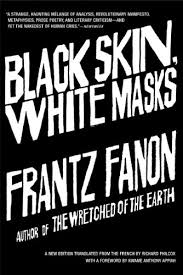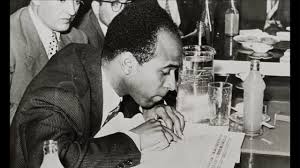
Frantz Fanon was a French West Indian psychiatrist and political philosopher from Martinique. Fanon was most well known for his work in post-colonial studies, critical theory, and Marxism with works such as The Wretched of the Earth and Black Skin, White Masks, his first book published in 1951. He writes about the struggle of decolonization in the context of independence war in Algeria from 1954-1962 in The Wretched of the Earth and was discussed in the documentary about Fanon titled Black Skin, White Masks. He turned to psychiatry as he thought psychiatry was used to regain freedom lost in the madness.
In Black Skin, White Masks specifically the chapters The Negro and the Language and The Fact of Blackness, touch on the topics of race relations between the colonized and the colonizer. The Negro and the Language discusses black people’s role in society, specifically when going to the country of the colonizer therefore racist societies, in regards to relations between the colonizer and the colonized. While The Fact of Blackness focuses on the role of black man and the image of black man in society. Fanon analyzes how black people exist in two different modes with other black people and amongst white people, specifying on the inferiority and superiority complexes between whites and blacks. This is due to the relation of the blacks and whites as the black man must be black because he must be black in relation to the white man. Ironically he, a Black person, writes in French about the importance of language with the example of speaking French as a black person as a negotiation in cultural belonging, therefore writing about his own identity throughout the piece.
But the issue with black people is that the construct of racism that has been spread through colonialism dehumanizes and depersonalizes black people having them question their reality as a human being. Therefore to feel as though they are human beings, they do so by committing actions in aspirations of being white and being closer to culture of the colonizing country. It separates the races into two different spaces where white people are humans through the act of dehumanizing others therefore ‘sealing themselves in their whiteness’ and black people try to be white in order to be human. In this case, the white man will only see the other when they lose their sense of reality. In the film, it mentions a cause of racism to be the denial of the desire for black women, for example, because she wants a white man to become of that recognized and superior group in society instead of the black man.
This division excludes black people from the category of humanity and within the colonial mindset black people do not have a culture of their own, therefore a language that holds importance and validity, and black people are understood through racist stereotypes created by white people and portrayed through the media. All happening in a ‘white world, an honorable world’ where the societal constructs made by the white man are that of the Negro as an animal, as savages, as bad, as mean, as ugly, as brutes, and as illiterates. This can cause internalized self-hatred due to these social constructs created by the white man with a visible example being the viral video of a dark skin little girl getting her hair done by her mom in which she started crying saying she was ugly because she was darker skinned. But the term Negro itself carries historical weight, causing them to have a fixed image in which the identity of the black man is traced to historicity becoming something defining regardless of personal accomplishments or achievements.
This racist complex derives from an economic process (capitalism), since economics and racism are tied together those of color will have the shorthand feeling inferior and creating a cycle of poverty and inferiority complexes. So, in racist societies black people and other minorities pay the price in lower socioeconomic living situations. Language in this case is used a vehicle for colonial oppression since language gives people a sense of identity. Colonialism encourages the colonized population to aspire to the experience and position of the oppressor, becoming an unattainable dream/goal, but only results in the alienation of the colonized from their own culture. These race dynamics cause confusion for mixed race children in the 21st century and promotes self-hatred amongst the colonized.
Fanon presents the example of the people of Antilles who were colonized by the French and those that travel to France to assimilate to colonial culture and are almost praised by those still in the colonized country, in this case Antilles. This was visually presented in the film O’ Soleil by Med Hondo and is talked discussed in the documentary about Stuart Hall. Language perpetuates this feeling of inferiority in Black people, black people first aspire to become white through the learning of language. But learning the language is not enough to become white because those that assume the superior position will find a way, whether explicit or implicit, to make it apparent you are inferior. Therefore a black person that does not speak French perfectly is uncivilized, almost primitive as it is assumed black people do not have a culture of their own. This becomes a clash between races, not civilizations as written by Samuel Huntington. When Antilles is denigrated, blackness is as well.
Although written years ago, his concepts on racism and race relations still stand. As Fanon, writes about language perpetuating inferiority and I think language simultaneously empowers and disempowers the colonized. It empowers the colonized by giving the colonized an upper hand by knowing an important language giving them more hope in succeeding at a better life due to the connection with the colonizing country. But it disempowers the colonized, hurting and affecting them even more through this illusion of a better life to find out they will never truly be accepted in Wester, or racist societies as Fanon says, therefore limiting the colonized to their stereotypic roles in society. As well, his discussion on assimilation to the colonizing country through language is seen in Italy more prevalent amongst the Hispanic community. I have noticed Hispanic immigrants more frequently than other immigrants tend to not teach their kids Spanish or their native languages, forcing them to only know Italian and not have an accent as the parents do. It allows the kids to assimilate better and not face discrimination (or as much) in hopes of being more Italian or white, therefore rejecting or putting aside their native culture with kids born in Italy or born in their native country. Through the rejection of their native culture, it is another element of these negating activities of a third person consciousness since the the man of color encounters difficulties in the development of a bodily schema.
